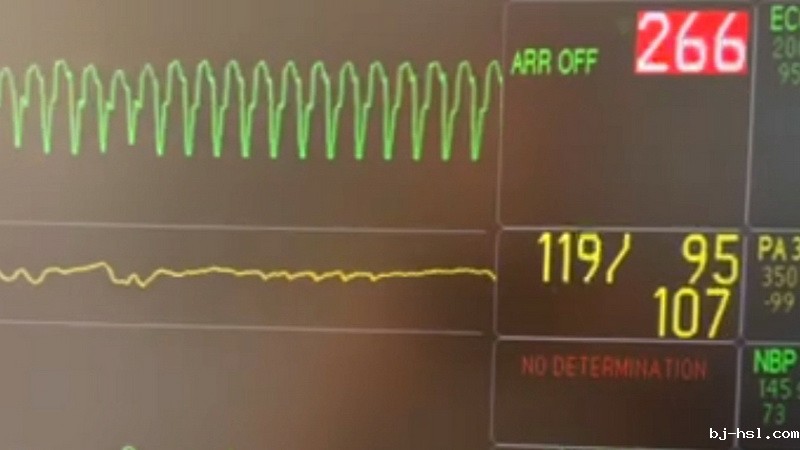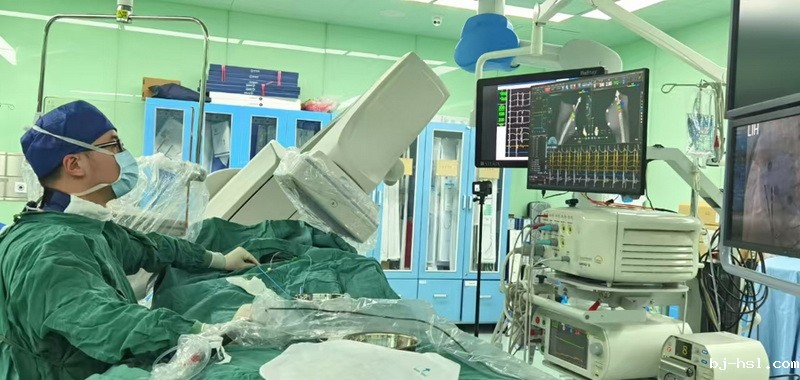Recently, the Department of Cardiology of Children’s Hospital of Fudan University, in collaboration with the Critical Care Medicine and Anesthesiology team, successfully performed radiofrequency ablation of Hirschsprung's Bundle paracentesis with extracorporeal membrane oxygenation (ECMO) for a 2-month-old child with persistent tachycardia combined with refractory heart failure, which broke through the forbidden zone of radiofrequency cardiac surgery in a low birth-age and low-birth-weight baby and created a miracle of life. On April 15, the child was successfully discharged from hospital after complete recovery of cardiac function.
A 2 months’ old boy from Zhejiang Province had frequent coughs and reduced milk intake, which the family initially mistook for a common cold. On 19 March, he was sent to a local hospital after experiencing irritability and difficulty breathing. The examination found that his heart rate was as high as 261 beats per minute, which was diagnosed as ‘supraventricular tachycardia’. Despite several attempts at electrical cardioversion and anti-arrhythmic drugs, the doctor was unable to restore the normal heart rhythm.
Due to tachycardia-induced severe heart failure, the boy was in poor spirits, and needed to be mechanically ventilated by endotracheal intubation. At this critical moment, the local hospital urgently contacted Children’s Hospital of Fudan University in Shanghai for support. At 1:00 a.m. on the 20 March, Director Lu Guoping of the Pediatric Intensive Care Unit(PICU) organised an emergency online consultation with experts Chen Weiming and Yan Gangfeng to guide the boy's resuscitation and treatment, and in the first instance, a professional transfer team from the PICU was sent to initiate a cross-provincial rescue, and the boy was safely transferred to Children’s Hospital of Fudan University PICU on the morning of March 20th.
However, his condition was still unstable. On the afternoon, his blood pressure suddenly dropped and his vital signs were on the verge of collapsing. The critical care team of Fudan Paediatrics decisively activated extracorporeal membrane lung (ECMO) support to temporarily stabilise the circulation, but the persistent arrhythmia could not be terminated, and the treatment came to an impasse.
In the face of this predicament, Zhao Quming, Deputy Director of Cardiology at the Cardiovascular Diagnostic and Treatment Centre of Children’s Hospital of Fudan University, assessed that the only way to save the child's life was to perform radiofrequency ablation supported by ECMO, as the combination of high-dose antiarrhythmic drugs failed to terminate the arrhythmia.
However, the child was only 2 months old and weighed 5kg, so the space for surgical operation was extremely limited. What's more, the preoperative prediction showed that the culprit causing the boy's episodes of unrelenting tachycardia was adjacent to the heart's conduction core, the Hirschsprung's Bundle, and that the slightest mishap would result in a permanent conduction block. According to Zhao, this type of surgery is characterised by high risk and low success rate even in adults, and there are no reports of ‘Hitchcock's Bundle bypass’ surgery on children as young as 5kg.
After thorough communication with the family, they chose to trust the medical team. Zhao Quming and Yan Gangfeng, chief physician of PICU, conducted repeated rehearsals and finalised a precise surgical plan. On March 21th, the boy was pushed into the operating room, and the Department of Anaesthesiology, after completing the high-risk anaesthesia, established a pathway in the thin blood vessels. With rich experience, Zhao Quming performed precision marking in the limited space and finally locked the lesion (bypass tract) at 1 o'clock in the tricuspid annulus, completely overlapping with the Hitchcock's bundle!
Under the premise of ECMO to maintain stable blood flow, Zhao adopted the ‘titrated’ ablation technique, gradually increasing the ablation energy, and finally destroyed the lesion precisely without damaging the normal conduction system, terminating the tachycardia that had lasted for nearly two months.
After the operation, the boy's heart rhythm returned to stable and his cardiac function improved rapidly. Soon he was successfully withdrawn from the ECMO and the ventilator, and was transferred to the general ward. After follow-up treatment by the cardiology team, the child's heart function was completely restored, and now his status and heart rate is basically the same as that of a normal baby, and the ultrasound of his heart shows the heart, which was obviously enlarged before, has completely returned to normal. On April 15th, he was successfully discharged from the hospital.
Professor Liu Fang, Director of Cardiovascular Diagnostic and Treatment Center of Children’s Hospital of Fudan University, introduced that radiofrequency ablation surgery in the high-risk area of the heart of low-age and low-birth-weight babies under the support of ECMO belongs to cutting-edge technology at home and abroad, and requires the implementation team to have strong multidisciplinary strength in the Department of Critical Care Medicine, electrophysiology of the Department of Cardiology, and anaesthesia, and there are only a handful of medical institutions at home and abroad which can complete the surgery. The successful treatment not only reflects the multidisciplinary collaboration ability of Fudan Pediatrics focusing on specialties, but also demonstrates another breakthrough in the diagnosis and treatment technology of difficult and serious diseases in pediatrics.


